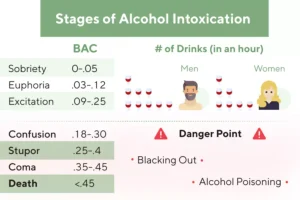
Dementia has many causes, and it can be difficult to distinguish causes. Sometimes, physical changes such as movement disorders or coordination problems can help differentiate types of dementia. Additionally, trained counselors and health care professionals could help your loved one stay sober in a supportive community environment.

What Are The Specifics Of Alcohol-Related Dementia?
- They may also experience intense sweating, anxiety and a high heart rate.
- People may also have motor difficulties due to impaired coordination and trouble walking, which can lead to safety concerns.
- A diagnosis of dementia requires a comprehensive physical and psychological evaluation.
- The best way to prevent alcohol-related dementia is to avoid drinking too much alcohol.
- Some experts think that a person can be assessed for alcohol-related ‘dementia’ while they are still drinking too much, as long as they aren’t intoxicated at the time of the assessment.
Treatment for alcoholic dementia primarily focuses on abstaining from alcohol to prevent further damage. Nutritional support, particularly thiamine supplementation, is critical to address deficiencies and support brain health. Rehabilitation programs may also drug addiction play a vital role in recovery, offering psychological support and strategies to manage symptoms. One important aspect of treatment is addressing any underlying medical conditions that may be contributing to the individual’s cognitive impairment.
How is alcoholic dementia treated?
As the years passed, I learned a lot about how best to care for my second Elaine – the one whose mind was riddled with Alzheimer’s. Doctors may confirm a diagnosis of alcoholic-related dementia with a brain MRI. While waiting for the scan result, some doctors may prescribe a vitamin B1 supplement to help reduce disease progression. If alcohol-related dementia is suspected, your doctor may recommend an MRI to confirm the diagnosis. Chronic alcohol consumption can gradually interfere with thiamine absorption, hindering its distribution and damaging cells. Every staff member of Florida Senior Consulting is a Certified Dementia Practitioner.
What Are The Symptoms Of Alcohol Atrophy In The Brain?
Medical detoxification may be necessary if a person has developed a physical dependence on alcohol. During detox, healthcare professionals can manage withdrawal symptoms and reduce complications. While sobriety seems like a clear and simple solution, it can be incredibly difficult for a person with alcohol use disorder to quit drinking. For this reason, the connection between alcohol can alcohol cause dementia and dementia in the elderly may be a hard obstacle to overcome. Talk with your loved one’s doctor about medical and therapeutic interventions. Staying alcohol-free can be particularly challenging if the person is homeless or isolated from their family due to drinking too much, or if they have poor physical or mental health.
- However, specialty neurology and memory clinics report lower numbers, between 3% and 5%, likely because fewer ARD cases are referred to them.
- These guidelines were developed to help people improve and maintain their overall health and reduce the risk of chronic disease.
- You could also consult with their doctor on your own or seek out the help of a professional counselor.
- Heavy alcohol consumption can lead to brain damage, which can result in cognitive impairment.
- Thus, by having moderate alcohol consumption, one may increase the risk of these conditions, thereby causing one to develop dementia.
- Living with or caring for someone experiencing alcohol-related brain damage can be challenging.

Older studies suggest ARD makes up about 10% of all dementia cases overall.2 These statistics are a stark reminder of how drinking can have life-altering consequences on mental function and independence. Many studies show that heavy drinkers have less brain volume overall with evidence of impaired memory, attention span, judgment, and other aspects of cognitive functioning. Neural connections are weakened or lost, and the reward system pathways no longer function as they once did.

Recent Comments